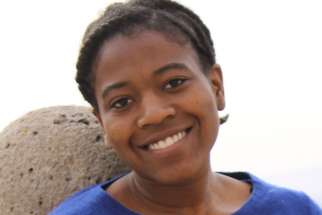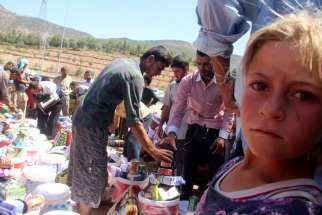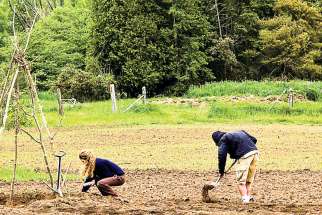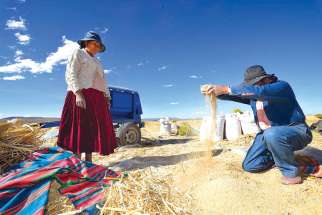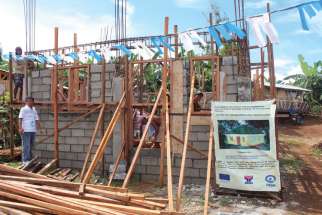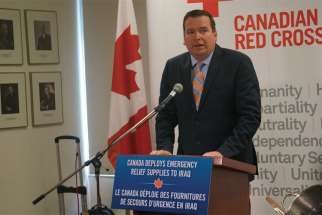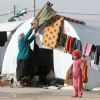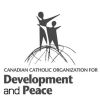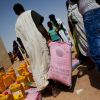Eating no longer a neutral act
I was thrilled to hear that my university’s office of campus ministry was hosting a “100-mile meal” potluck, preparing a meal made with ingredients found within 160 kilometres of my home. By eating locally we become proactive agents of change. We support our local farmers and our economy.
Funding for D&P to help Iraqi refugees through winter
Thousands of refugees who fled Mosul, Iraq, six months ago, now living in tents near the border with Turkey, will get more stable and winter-ready housing thanks to an extra $2.4 million in government funding given to the Canadian Catholic Organization for Development and Peace.
Farming locally, helping globally
Fifty years ago Len Kraemer was young, strong, intelligent and rural, which is why he was helping bring in a crop of hay on the family farm near Walkerton, Ont. As he jammed his gloves on harder and lifted bales of hay under the afternoon sun, young Kraemer started thinking about Africa.
The human tragedy of hunger
The planet produces enough food to feed everyone, yet more than 800 million people go hungry every day.
D&P hopeful, but wary, of federal corporate responsibility policy
A relaunched corporate social responsibility policy for Canadian mining companies has Development and Peace hopeful that Canadian companies will be held accountable for their environmental, labour and community investment records in Latin America, Africa and Asia.
Trying to reconcile faith with farming ethics
Charina Umagat has been an involved, engaged parishioner at St. Emile parish in Winnipeg for 20 years. The last thing she expected to find in her pew on a Sunday was a pamphlet casting moral doubt on her job and her employer.
Canadian charities help Filipinos rebuild
Every one of the $13 million Development and Peace raised last year to help Filipinos left homeless by the most powerful hurricane ever to make landfall has a job to do. Thousands of Filipino families are still living in tents, in the beached hulks of ships Typhoon Haiyan left stranded on the streets of Tacloban City and in elementary schools where Filipino families first found shelter from the storm 10 months ago.
D&P receives $1 million in aid to help displaced Iraqis
OTTAWA - The Department of Foreign Affairs, Trade and Development Canada is giving $1 million to the Canadian Catholic Organization for Development and Peace to help displaced Iraqis.
D&P appeals for aid for Syrian refugees
The Canadian Catholic Organization for Development and Peace is funnelling aid to its Caritas partners to respond to frigid winter temperatures in the Mideast that have hit an estimated two million Syrians displaced by the country's civil war and hundreds of thousands of refugees outside of Syria's borders.
Paper trail shows D&P cuts defied all advice
Internal e-mails, briefing notes and memoranda obtained by The Catholic Register reveal that a government decision to cut funding to Canada’s Catholic development agency went against the advice of almost everyone consulted, including its own bureaucracy.
New D&P president comes on board in trying times
Facing high-profile resignations and protests from within the organization, massive budget cuts and a complete reorganization, the Canadian Catholic Organization for Development and Peace
D&P’s French youth wing pulls out of fall campaign
(UPDATED 25/10/12)
The French-speaking youth wing of the Canadian Catholic Organization for Development and Peace has withdrawn its support of the organization’s fall education campaign and next spring’s Share Lent drives in protest over a decision to first delay and then change this fall’s education campaign.
Development and Peace’s traditional fall campaign was to have included postcards addressed to Prime Minister Stephen Harper requesting a national consultation on the direction of foreign aid policy. CCCB president Archbishop Richard Smith and CCCB general secretary Msgr. Pat Powers informed Development and Peace’s leaders in September that several bishops were uncomfortable with the directly political tone of the campaign, leading Development and Peace to delay the launch for a month and withdraw the postcards.
“This decision by our leadership undermines the credibility of our movement and renders it impossible to recruit new members or to maintain engagement among our youth groups,” wrote nine francophone youth representatives who met in Montreal just before the fall education campaign launched Oct. 15.
In a “declaration” issued Oct. 16, the representatives claim the way in which the bishops maneuvered Development and Peace into compromising its plans caused them to question the prophetic role of the organization within the Church.
“We have cried and shared our suffering and anger,” they wrote.
The young members said they understood the gravity of withdrawing their support at this time but claimed something had to be done to force reform on the leadership. Instead of participating in the fall campaign the youth wing will launch an internal campaign to return Development and Peace to its democratic roots and original mission.
Attracting new members, especially among youth, is one focus of this fall’s campaign.
“We knew there would be some members who would be very frustrated with this. That’s not a surprise,” said Development and Peace national council president Ronald Breau.
The national council is looking forward to speaking with youth representatives about their concerns, Breau said. Ariane Collin, who represents francophone youth on the national council, will be able to present her concerns at a full national council meeting scheduled for Nov. 30 to Dec. 2. Internal dissension is a normal part of life in Development and Peace, said Breau.
“I don’t think we’re seeing the disintegration of the movement,” he said. Some of the most vocal criticism of CCCB interference in the organization’s affairs has come from Quebec and francophone New Brunswick, but Breau said he doesn’t believe the Catholic movement set up by Canada’s bishops in 1967 is splitting along linguistic lines.
“I don’t see a French-English split. I see that the French members have a real passion, they have a real strong foundation and they really, really believe — and they’re more expressive,” Breau said.
“That’s good for the movement.”
The bishops are not worried about a gulf between English and French opinion on the development agency, said CCCB spokesman Rene Laprise.
"Half of the members of the CCCB standing committee (on Development and Peace) are francophones, as are half the members of the CCODP liaison committee, and our experience with both committees has shown no divisions along linguistic lines," Laprise wrote in an email.
The CCCB has backed the "Do It Justice" fall campaign by announcing the launch and posting a link to the Development and Peace site on it's own web site. A four-page background paper on international development policy got the thumbs up with only minor changes from the CCCB’s committee on Development and Peace and from Development and Peace’s liaison committee for relations with the bishops. The campaign materials also include a video introduction viewable on YouTube. Other campaign materials are available at www.devp.org .
D&P raises $1.8 million for African relief
Millions of Africans have food today thanks to $1.8 million Canadian Catholics have given to their development agency.
The federal government will kick in about $1.3 million in matching funds to top up five months of fundraising by the Canadian Catholic Organization for Development and Peace.
As drought struck the six-country region in May, Development and Peace saw famine on the horizon and began raising money. By August Ottawa stepped in to announce a matching funds program. A final tally of how much of Development and Peace's Sahel region fundraising is eligible for matching funds is pending, but so far the organization has identified approximately $1.3 million that Ottawa should match.
The total Development and Peace commitment in the region comes to almost $8 million, including a $5-million food distribution program the Canadian bishops' development agency is working on with Canadian Foodgrains Bank in three Sahel countries.
In Mali, Niger, Burkina Faso, Mauritania, Chad and Senegal Development and Peace is working with longstanding partner agencies and the Caritas Internationalis network on seed and food distribution, cash-for-work programs, subsidized food sales and nutrition clinics.
The federal government matching program ended Sept. 30.
Development and Peace, bishops continue close collaboration
OTTAWA - During the annual plenary of the Canadian Conference of Catholic Bishops (CCCB) in Ste. Adele, Que., Sept. 24-28, the bishops reaffirmed their ongoing collaboration with their overseas development agency, both respecting its lay-run character and ensuring its Catholic identity.
The lay-run character of the Canadian Catholic Organization for Development and Peace came under fire in recent weeks when its fall education campaign was put on hold after several bishops objected to the campaign for being too political, as first reported in The Catholic Register. The National Post and its sister papers picked up on the story Sept. 26.
The stories saying the bishops intervened, blocked or stopped the fall program are inaccurate, said CCCB president Archbishop Richard Smith in a post-plenary interview from Edmonton Oct. 1.
“The most important thing to emphasize is the bishops are working with D&P on their fall campaign,” said Smith.
The bishops support the principle of D&P’s annual fall educational campaign which raises consciousness about the needs in the developing world “to make people aware of the plight but also the reasons behind it,” he said.
D&P can embark on education programs, but when the strategy includes working through the parishes in local dioceses, “nothing should be taking place without the consent of the local bishop,” he said.
This year’s fall campaign departed from D&P’s plan of focusing on environmental themes to raising questions about Canada’s international aid policies, following substantial reductions in CIDA grants over the next five years. The agency, founded by the bishops more than 40 years ago, was “formulating a campaign as part of a broader movement of development agencies,” Smith said.
“Some of the material was becoming a little more direct political lobbying than we’re accustomed to,” Smith said. Some bishops, Smith included, expressed concern the materials might cause divisiveness in parishes and among donors.
The bishops must ensure “whatever’s done fosters the unity of the Church and is in no way divisive,” he said.
Smith said he spoke to the leadership of D&P about the concerns, which they received graciously, openly and with a “readiness to understand.”
D&P’s leadership “gave some thought to the impact on the life of the Church” of their campaign and told the bishops they would “adjust their literature to reflect their concerns.”
The bishops also heard a report from Toronto Auxiliary Bishop John Boissonneau, from the Liaison Committee composed of D&P leadership and the CCCB’s Standing Committee on Development and Peace, about the progress of documents outlining the principles guiding D&P’s relationship with its overseas partners, contracts with partners, the integration of Pope Benedict XVI’s social justice encyclical Caritas in Veritate into the agency’s work and the training of its staff.
Smith said the documents are “close to final draft stage” and “are still being reviewed.”
In other plenary news, the bishops approved next year’s budget and saw nothing unusual in the present financial pictures of the conference. There will be no hike this year in the per capita rates charged dioceses based on the numbers of Catholics living there.
The bishops also had an off-the-record meeting with Immigration Minister Jason Kenney and that went well, Smith said.
“The conversation was very respectful, open and very frank... It was a welcome opportunity to speak to the minister as a voice for the voiceless,” Smith said. “He certainly did hear us.”
The bishops also marked the upcoming 50th anniversary of the opening of the Second Vatican Council. Smith spoke of how Pope Benedict XVI in his emphasis on the Year of Faith is the clearest voice calling for people to read and understand the documents of the Second Vatican Council so the new evangelization can be based on the beauty of the Catholic faith articulated in them.
Development and Peace fall campaign is put on hold
The traditional fall education campaign of the Canadian Catholic Organization for Development and Peace is on hold until Oct. 15 while staff and volunteers scramble to come up with less political material that will gain the backing of all of Canada's bishops.
Canadian Conference of Catholic Bishops president Archbishop Richard Smith and general secretary Msgr. Pat Powers informed Development and Peace Sept. 5 that several bishops had objected to the fall campaign and did not want the material distributed in their diocese. It is the first time in the 45-year history of the Catholic development agency that the bishops have intervened to block an education campaign.
Neither the CCCB nor Development and Peace could tell The Catholic Register how many bishops have objected to campaign materials, which have been printed but not yet distributed. Through a spokesperson, Smith declined to be interviewed for this story as "the bishops have not had a chance to discuss the issue."
Bishops on the CCCB's Standing Committee on Development and Peace were not consulted on the move to halt the campaign and have not seen the materials.
"I haven't had it explained to me, so I can't really comment," said Toronto's Bishop John Boissonneau, chair of the committee. "I was aware that the president of the conference sent out a letter, but there's been no follow-up with me directly."
"I kind of feel out in the cold on this," said committee member Bishop Richard Grecco of Charlottetown.
The last time the bishops' committee met was May 31 for a consultation with the Development and Peace liaison committee for relations with the bishops. Meanwhile, work on the fall education campaign had been delayed until June while the organization dealt with major restructuring to accommodate a drastic cut in Canadian International Development Agency funding.
The fall campaign was to have veered off-course from Development and Peace's five-year plan of environmentally themed education campaigns. This campaign, which included postcards addressed to Prime Minister Stephen Harper, was conceived as a national consultation on the direction of Canada's foreign aid policy.
A copy of a Development and Peace postcard addressed to Harper was obtained by The Catholic Register. It asks Harper to "launch a national consultation on the future of Canadian development assistance." The card also urges a "Special Parliamentary Committee to examine the new direction of Canadian assistance."
"The trend in how Canada's foreign aid programs are administered has changed quite dramatically," Development and Peace executive director Michael Casey told The Catholic Register. "The role for civil society organizations like us is becoming less apparent. More of the money is going to multilateral institutions, private sector development.... We wanted to see if a constructive critique of this policy from our perspective could get a hearing."
The campaign did not mention the $35-million cut over five years in CIDA funding to Development and Peace, said Casey, and is not an attempt to revisit the funding decision, he said.
"Concerns were expressed regarding the nature and methodology of the campaign with respect that it could create some divisiveness within the Church community and that perhaps there should be some more consultations within D&P and also with the broader Church," said Ronald Breau, Development and Peace national council president.

Archbishop Smith
- Register file photo
Breau wrote to the Development and Peace membership Sept. 17 to explain the delay.
"We are fully aware that our decision will disappoint many of our active and engaged members," Breau wrote.
While the campaign will be modified, the fall action campaign will remain focussed on Canada's development aid policies. But the national council is heeding Smith's warning that the original campaign would "lead to division among our base, among bishops and among our supporters," Breau wrote.
"The bishops are concerned that ongoing dialogue between the Catholic Church and the Government of Canada on some important, timely and sensitive issues might be compromised by our approach at this time."
Parish Development and Peace leader Greg Kennedy is left wondering what his group will do while it waits for the campaign to launch.
"Traditionally Development and Peace at the parish level operates basically two times a year — one in the fall with the education campaign and then the Share Lent or ShareLife in (the Toronto archdiocese)," said the Jesuit, who is studying for the priesthood and helping out at Our Lady of Lourdes in downtown Toronto. "Without those bookends, really there's not much to do until Lent."
The appearance that the bishops are divided or opposed to Development and Peace has become a challenge for parish groups, said Kennedy. And the idea that the bishops' conference did not inform its own standing committee will be even more confusing.
"The bishops set up these avenues through which both they and Development and Peace would work and all of a sudden that gets over-ridden. That's disturbing," he said. "What's the point of having them if they're not going to be used."
But lobbying the government on policy does not amount to education, said Grecco.
"We can have that dialogue (on Canadian development policy). I just don't think it should be a campaign. That's not what D&P should be about."


